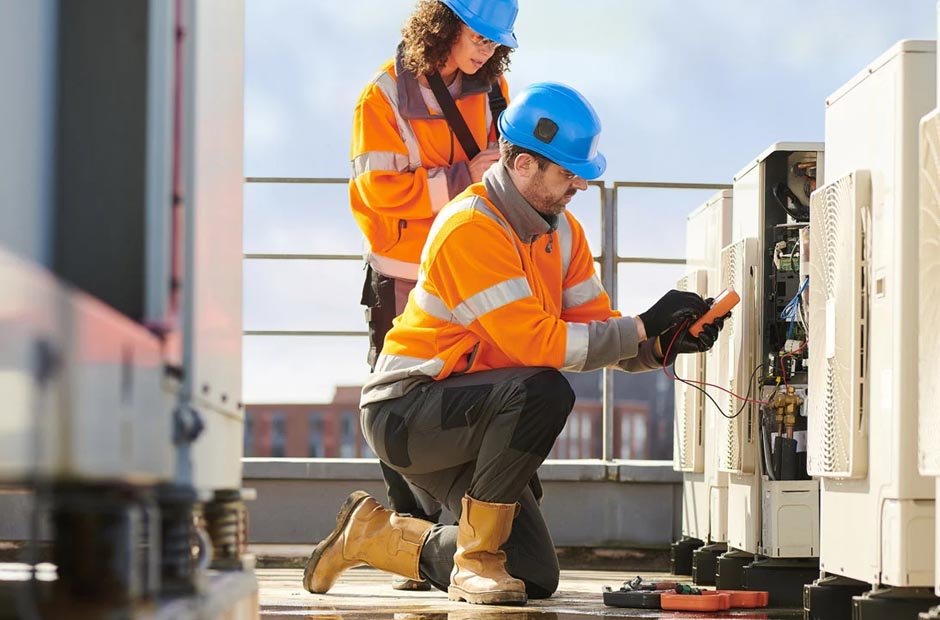HVAC contractors ensure that buildings maintain optimal living and working conditions through effective heating, ventilation, and air conditioning systems. These professionals are responsible for a broad spectrum of activities, from the initial system design and installation to maintenance, repair, and upgrades, significantly impacting building management and operational efficiency. We will outline the expansive duties of HVAC contractors, emphasizing their role in system design, installation, maintenance, emergency services, regulatory compliance, and the integration of cutting-edge technologies.
Table of Contents
The Pivotal Role of HVAC Contractors
System Design and Strategic Planning
HVAC contractors begin their involvement by focusing on designing and strategically planning systems tailored to each building’s specific requirements. This stage demands a comprehensive understanding of thermal dynamics, load calculations, and energy efficiency. The contractor must consider various factors, including building layout, geographical orientation, local climate, and potential occupancy, to ensure the HVAC system is efficient and effective. Strategic system design is foundational, setting the stage for optimal performance and energy utilization throughout the building’s lifecycle.
Implementing HVAC Systems
Following the design phase, HVAC contractors manage the physical installation of the systems. This process involves meticulous coordination with other construction professionals to ensure that the HVAC components are installed correctly and function cohesively within the building’s infrastructure. Installation tasks may include laying ductwork, setting up ventilation systems, and configuring heating and cooling units. The precision of this work is critical as it directly affects the system’s overall efficiency and performance.
Regular Maintenance and Performance Optimization
HVAC contractors’ primary responsibility is ongoing maintenance, which ensures systems operate efficiently over time. Regular maintenance tasks include inspecting and cleaning components like coils and filters, calibrating thermostats, and checking fluid levels. These activities prolong the system’s lifespan and enhance efficiency, reducing energy costs and increasing comfort for building occupants. Additionally, contractors often perform seasonal adjustments and optimizations to adapt the system’s performance to changing weather conditions.
Rapid Response to Emergency Situations
HVAC contractors must also provide rapid response services for system failures or critical performance issues. Quick and effective troubleshooting and repair are essential, especially during peak usage when heating or cooling is most needed. This role involves diagnosing problems accurately, replacing faulty components, and ensuring that the system returns to optimal operation with minimal downtime, all while maintaining a high level of service quality.
Ensuring Compliance with Regulations and Standards
A significant aspect of the HVAC contractor’s role involves ensuring all systems meet local, state, and federal regulations and standards. These may include safety standards, environmental regulations, and energy efficiency mandates. HVAC contractors must stay informed about current laws and updates to ensure compliance and avoid penalties. This regulatory responsibility ensures that systems are safe for use and environmentally sustainable, contributing to broader public health and safety objectives.
Incorporating Technology and Innovative Solutions
With the advancement of technology, HVAC contractors are increasingly involved in integrating innovative solutions into traditional systems. This includes the adoption of smart thermostats, IoT-enabled monitoring tools, and energy management systems that enhance system intelligence and autonomy. These technologies enable precise control over HVAC operations, improve energy efficiency, and offer detailed analytics for ongoing system improvement.
Advisory and Consultation Services
HVAC contractors often serve as project consultants, providing expert advice on system upgrades, energy conservation measures, and new construction considerations. This advisory role is crucial for clients looking to make informed decisions about their HVAC investments. Contractors assess existing systems for efficiency and potential improvements, recommend technologies that align with the client’s sustainability goals, and provide cost-benefit analyses for different HVAC solutions.
Training and Development
HVAC contractors play a less recognized but vital role in training and developing their teams. Continuous professional development is essential, given the rapidly evolving nature of HVAC technologies and regulations. Contractors organize training sessions for new hires and ongoing education for experienced technicians, ensuring their staff remains competent in the latest HVAC techniques and compliant with current standards.
Critical Contributions of HVAC Contractors to Building Management
HVAC contractors play a fundamental role in the management and operation of building facilities. Their extensive responsibilities ensure that HVAC systems are initially well-designed and correctly installed, maintained effectively, and upgraded as necessary with the latest technologies. This comprehensive management contributes significantly to the overall comfort, safety, and efficiency of buildings, highlighting the indispensable role of HVAC contractors in the architecture of modern facilities.










